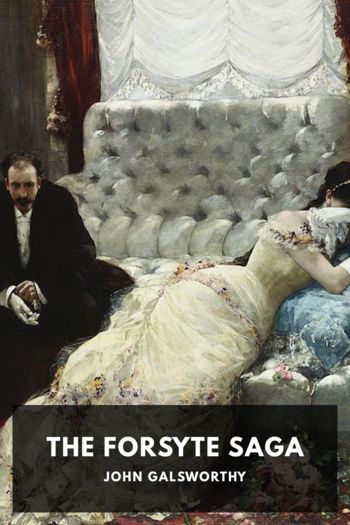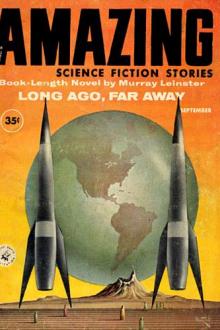The Forsyte Saga - John Galsworthy (best english novels for beginners .txt) 📗

- Author: John Galsworthy
Book online «The Forsyte Saga - John Galsworthy (best english novels for beginners .txt) 📗». Author John Galsworthy
At Oxford, however, rather different sentiments prevailed. The inherent effervescence of conglomerate youth had, during the two months of the term before Black Week, been gradually crystallising out into vivid oppositions. Normal adolescence, ever in England of a conservative tendency, though not taking things too seriously, was vehement for a fight to a finish and a good licking for the Boers. Of this larger faction Val Dartie was naturally a member. Radical youth, on the other hand, a small but perhaps more vocal body, was for stopping the war and giving the Boers autonomy. Until Black Week, however, the groups were amorphous, without sharp edges, and argument remained but academic. Jolly was one of those who knew not where he stood. A streak of his grandfather old Jolyon’s love of justice prevented him from seeing one side only. Moreover, in his set of “the best” there was a “jumping-Jesus” of extremely advanced opinions and some personal magnetism. Jolly wavered. His father, too, seemed doubtful in his views. And though, as was proper at the age of twenty, he kept a sharp eye on his father, watchful for defects which might still be remedied, still that father had an air which gave a sort of glamour to his creed of ironic tolerance. Artists, of course, were notoriously Hamlet-like, and to this extent one must discount for one’s father, even if one loved him. But Jolyon’s original view, that to “put your nose in where you aren’t wanted” (as the Uitlanders had done) “and then work the oracle till you get on top is not being quite the clean potato,” had, whether founded in fact or no, a certain attraction for his son, who thought a deal about gentility. On the other hand Jolly could not abide such as his set called “cranks,” and Val’s set called “smugs,” so that he was still balancing when the clock of Black Week struck. One—two—three, came those ominous repulses at Stormberg, Magersfontein, Colenso. The sturdy English soul reacting after the first cried, “Ah! but Methuen!” after the second: “Ah! but Buller!” then, in inspissated gloom, hardened. And Jolly said to himself: “No, damn it! We’ve got to lick the beggars now; I don’t care whether we’re right or wrong.” And, if he had known it, his father was thinking the same thought.
That next Sunday, last of the term, Jolly was bidden to wine with “one of the best.” After the second toast, “Buller and damnation to the Boers,” drunk—no heel taps—in the college Burgundy, he noticed that Val Dartie, also a guest, was looking at him with a grin and saying something to his neighbour. He was sure it was disparaging. The last boy in the world to make himself conspicuous or cause public disturbance, Jolly grew rather red and shut his lips. The queer hostility he had always felt towards his second-cousin was strongly and suddenly reinforced. “All right!” he thought, “you wait, my friend!” More wine than was good for him, as the custom was, helped him to remember, when they all trooped forth to a secluded spot, to touch Val on the arm.
“What did you say about me in there?”
“Mayn’t I say what I like?”
“No.”
“Well, I said you were a pro-Boer—and so you are!”
“You’re a liar!”
“D’you want a row?”
“Of course, but not here; in the garden.”
“All right. Come on.”
They went, eyeing each other askance, unsteady, and unflinching; they climbed the garden railings. The spikes on the top slightly ripped Val’s sleeve, and occupied his mind. Jolly’s mind was occupied by the thought that they were going to fight in the precincts of a college foreign to them both. It was not the thing, but never mind—the young beast!
They passed over the grass into very nearly darkness, and took off their coats.
“You’re not screwed, are you?” said Jolly suddenly. “I can’t fight you if you’re screwed.”
“No more than you.”
“All right then.”
Without shaking hands, they put themselves at once into postures of defence. They had drunk too much for science, and so were especially careful to assume correct attitudes, until Jolly smote Val almost accidentally on the nose. After that it was all a dark and ugly scrimmage in the deep shadow of the old trees, with no one to call “time,” till, battered and blown, they unclinched and staggered back from each other, as a voice said:
“Your names, young gentlemen?”
At this bland query spoken from under the lamp at the garden gate, like some demand of a god, their nerves gave way, and snatching up their coats, they ran at the railings, shinned up them, and made for the secluded spot whence they had issued to the fight. Here, in dim light, they mopped their faces, and without a word walked, ten paces apart, to the college gate. They went out silently, Val going towards the Broad along the Brewery, Jolly down the lane towards the High. His head, still fumed, was busy with regret that he had not displayed more science, passing in review the counters and knockout blows which he had not delivered. His mind strayed on to an imagined combat, infinitely unlike that which he had just been through, infinitely gallant, with sash and sword, with thrust and parry, as if he were in the pages of his beloved Dumas. He fancied himself La Mole, and Aramis, Bussy, Chicot, and D’Artagnan rolled into one, but he quite failed to envisage Val as Coconnas, Brissac, or Rochefort. The fellow was just a confounded cousin who didn’t come up to Cocker. Never mind! He had given him one or two. “Pro-Boer!” The word still rankled, and thoughts of enlisting jostled his aching head; of riding over the veldt, firing gallantly, while the Boers rolled over like rabbits. And, turning





Comments (0)